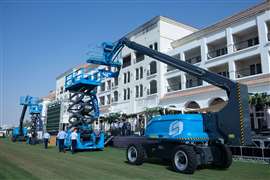Snorkel approves Sanctuary Zone system for its booms
26 June 2013
.jpg)
Snorkel’s global engineering team has approved the Sanctuary Zone additional overhead crushing protection system for use on its boom lifts.
Sanctuary Zone was developed by UK powered access rental company AFI-Uplift, but is now sold under licence by another UK-based company, Aerial and Handling Services.
The device comprises a steel frame that helps protect the machine operator from being crushed between the platform and an overhead obstacle. Two pieces are side mounted on the guardrails to create a roll bar effect, with an overhead bar running between them to provide additional protection.
Weighing less than 25kg (55 pounds), the Sanctuary Zone can be fitted to a platform in 20 minutes. Snorkel said the curved steelwork ensures the 660mm (26-inch) tall structure does not get caught on safety netting.
Snorkel has approved Sanctuary Zone as an attachment to its global platform measuring 2.4m x 1m (8 feet x 3 feet, 3 inches), which is fitted to all of its mid-sized and large telescopic booms (14m/40 feet and upward) and all articulated booms 19m/62 feet and upward.
The manufacturer has also approved the system for its popular A46JRT 14m (46-foot) articulated rough terrain boom and its A46JE electric equivalent. Engineers will approve the use of Sanctuary Zone on other Snorkel platforms on a case-by-case basis.






